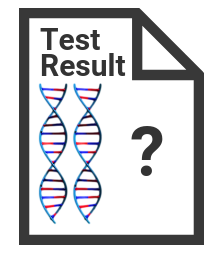
What is a VUS?
A VUS means a difference in a gene was found
- A VUS does not usually change your medical care
- In the future we may find more information about VUS results:
- Most of the time, new information will show that a VUS is a “benign variant.” (This means the difference in the gene does not raise cancer risk).
- Less often new information will show that a VUS is actually a “pathogenic variant.” (This means the difference in the gene does increase cancer risks)
What does this mean for my cancer risk?
A VUS doesn’t tell us anything about your cancer risks. Everyone is at risk for cancer. Your risk for cancer may be higher if:
- You or a close relative (parent, brother, sister, child) have had cancer
- You have several relatives with cancer
What can I do to lower my risk for cancer?
There are options to prevent certain cancers or find them early
- Your doctor can talk to you about what options may be best for you
- Medical care is usually based on your personal and family history of cancer
Should my family members be tested for the VUS?
It depends:
- Most of the time testing family members is not useful because a VUS will not usually change their medical care
- Sometimes family members will be asked to join a research study to learn more about the VUS
Why is it important to share information with my family?
Sharing cancer family history information may help your family prevent cancer or find it early.
- Your family members may still be at higher risk for cancer because of the family history
- A family history of cancer might change medical care for your family members
Healthcare providers may use your test result to help decide about testing for other family members. However, family members are unlikely to benefit from genetic testing themselves unless…
- the family member has cancer and you don’t have cancer
- the family member has a history of cancers on their other side of the family
- new genes are discovered that were not included in your test
- there are other reasons to test them
How can I share information with my family members?
People often talk with their family in person or by phone and give them written or electronic information. Some also choose to send an email or letter.
- If you choose to talk to your family members we have ideas of what you might say here (ADD LINK)
- Sharing written information or a video can…
- help your family remember what you talked about
- may answer questions they have
- makes it easier for them to share information with other family members and their healthcare providers
What information should I share with my family?
Share information about who in the family has had cancer, what types of cancers, and at what ages.
- Worksheet to collect cancer family history (ADD LINK)
- Online tools to collect cancer family history (ADD LINK)
Cancer prevention information may help your family take action to lower their risk
- Breast cancer risks and prevention (ADD LINK)
- Colon cancer risks and prevention (ADD LINK)
You may decide to share a copy of your genetic test result and/or information about VUS results. If you do it may be important for family members to know: 1) VUS results should not change medical care and 2) they may not need genetic testing.
- Handout about VUS results for family members (ADD LINK)
- 3-minute video about VUS results (ADD LINK)